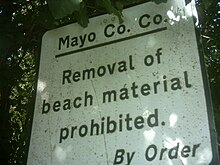Sand theft
hideThis article has multiple issues. Please help or discuss these issues on the talk page. (Learn how and when to remove these template messages)
|

Sand theft or unauthorised or illegal sand mining leads to a widely unknown global example of natural and non-renewable resource depletion problem comparable in extent to global water scarcity.[1][2][3] Beach theft is illegal removal of large quantities of sand from a beach leading to full or partial disappearance of the beach.
Sand and beach theft by country[]
Sand theft is a worldwide phenomenon.[4][5][6][7] Beach theft, the large-scale removal of sand to the point that entire stretches of a beach disappear, is considerably less common.
Two instances of beach thefts have been widely reported in the media: one in Hungary in 2007 and another in Jamaica in 2008. The beach that was stolen in Hungary was an artificially created one on the banks of a river. The other one is a genuine example of a beach theft.
China[]
Too much sand was taken from the Yangtze River to help build Shanghai in the 1980s and 1990s, prompting the Chinese government to ban sand mining there in 2000. However, smugglers continue to take sand. They evade capture by hacking and cloning the automatic tracking systems of other ships, leading to multiple collisions.[8]
Greece[]
The pink sands of Elafonisi, created by tidal and wave-induced deposits of pigmented microorganisms living in a symbiotic relationship with native seaweed, were a frequent subject of souvenir-taking by tourists until the Greek government declared the area a nature reserve and prohibited the sands' removal; even today, color saturation levels remain at only around 10% of those in the early twentieth century.
Hungary[]
An incident of beach theft occurred in Hungary in 2007.[9] In this case, multiple tonnes of sand were stolen by thieves from an artificial beach created by a resort in Mindszent alongside the banks of the Tisza river. Approximately 6,000 cubic meters of sand were shipped in and lounge chairs, playground rides, and beach huts were added. Owing to the harsh Hungarian winters, the owners of the resort covered the rides with tarpaulin and closed the resort for the season in September 2007. When one of the owners drove by, they noticed that the beach was gone.
India[]
In South India, the problem appears so pronounced that a particular Tamil term – manarkollai – has been coined.
Jamaica[]
Sand is used in unregulated home-building across the island.[10]
Involvement by hotels was suspected in a July 2008 heist, where 500 truckloads of sand were stolen from a 400-metre stretch of beach at Coral Springs in the northern parish of Trelawny.[11] The beach was to be part of a resort complex, but development halted after the theft. Sand was reported to have turned up on other beaches, but no charges were ever made.
Singapore[]
Singapore is the world's largest importer of sand,[12][13] using it for land reclamation that has increased the country's size by 20% since independence.[12] Much of the imported sand has reportedly been mined illegally in Malaysia, Indonesia and Cambodia.[12][13]
Effects[]
Although sand theft does not seem to be a serious problem at first, it is nonetheless a serious problem as the removal of sand facilitates soil salinisation. For example, in Cape Verde, the theft of sand has caused the soil to salinify to such a degree, that a large number of orchards were permanently destroyed in the process.[citation needed]
See also[]
- Resource depletion
- Sand replenishment
- Illegal mining
- Sand Wars
References[]
- ^ Vince Beiser (26 March 2015). "The Deadly Global War for Sand". wired.
- ^ Christian Hellwig (19 April 2015). "Illegal Sand Mining is a Thing and it's a Problem". Global Risk Insights.
- ^ Jakob Villioth (5 August 2014). "Building an economy on quicksand". ejolt.
Sand has by now become the most widely consumed natural resource on the planet after fresh water
- ^ "Hanson Denies Stealing Sand", Los Angeles Times dated 28 October 2003 (Retrieved 23 October 2008)
- ^ "Stealing sand from Sahara", Western Sahara Resource Watch [1] (Retrieved 23 October 2000)
- ^ Shifting Sands report Archived 4 October 2013 at the Wayback Machine
- ^ "Sand thieves strike again", Voice of Malaysian Archived 29 April 2016 at the Wayback Machine dated 9 August 2008, retrieved 23 October 2008)
- ^ Harris, Mark. "Ghost ships, crop circles, and soft gold: A GPS mystery in Shanghai". MIT Technology Review. Retrieved 14 December 2019.
These ships have been cloning the AIS identities of other ships in order to slip in and out of the harbor unmolested by authorities.
- ^ "Eltűnt homokos strandot keresnek a Tisza-parton" [2] (Retrieved 12 November 2013)
- ^ Carroll, Rory (21 October 2008). "Jamaican police left stranded after thieves steal a beach". The Guardian. Retrieved 1 March 2021.
- ^ Davis, Nick (18 October 2008). "Jamaica puzzled by theft of beach". BBC News. Retrieved 1 March 2021.
- ^ Jump up to: a b c https://www.theguardian.com/global/2018/jul/01/riddle-of-the-sands-the-truth-behind-stolen-beaches-and-dredged-islands
- ^ Jump up to: a b https://www.theonlinecitizen.com/2018/07/03/singapore-under-scrutiny-for-alleged-involvement-in-illegal-sand-import-for-land-reclamation/
- Theft
- Beaches
- Illegal mining
- Sand